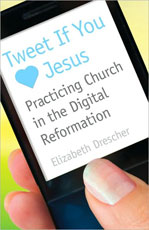In the preface to this much-needed book, The Right Reverend Kirk Smith, bishop of the Episcopal Diocese of Arizona says: "We blew it with radio; we blew it with television. The question is whether we'll be able to make use of these new tools while there is still a window of opportunity." The tools he is referring to are websites, blogs, and the social media of Facebook, Twitter, Flickr, and YouTube. Can the clergy and laity of mainline denominations (the Seven Sisters of American Protestantism) enter the complex world of these new technologies at this later date and still reap the benefits for their parishes, denominations, and local communities?
Elizabeth Drescher says, "Yes, we can!" She is an educator, scholar, writer, and speaker on Christian spirituality who teaches in the undergraduate program in Religious Studies and the graduate program in Pastoral Ministry at Santa Clara University.
Dr. Drescher is a regular contributor to the online magazine, Religious Dispatches and a well-known preacher, conference speaker, and workshop leader. You may visit her at her website http:// www.elizabethdrescher.net.
The author has written this paperback for pilgrims, skeptics, and pioneers of the Digital Reformation that is taking place right now. It offers clergy and congregations the chance to open new doors to communication, relationship, and leading and creating community. By listening, attending, connecting, and engaging the social media, Christians can revitalize the church and set the stage for new spiritual possibilities to bloom.
Dresher believes that Christian leaders can kick the old habit of medieval obedience and move on to the new realm of digital improvisation. With formidable creativity, she suggests that St. Paul can be seen as a blogger or a "networked communicator." What does this entail? The author responds, "It's not about sending out a message, but about connecting to a lived reality and inviting people to share their own take on that." Drescher then writes about some religiously themed Facebook groups who are demonstrating this sort of participative communication.
The social media also offers Christians varied opportunities to tap into social activism, learn about digital prophets, and collaborate with others in mending the world. And church leaders can take a cue from the wisdom of the ancient Desert Fathers and Mothers whose sayings were brief but pithy. The question put to every Christian user of Twitter is the same one put to the desert elders: "Give me a word." If they were alive today, these seers would be sharing 140 character messages. The book closes with a showcase of the digital reformation in practice.
